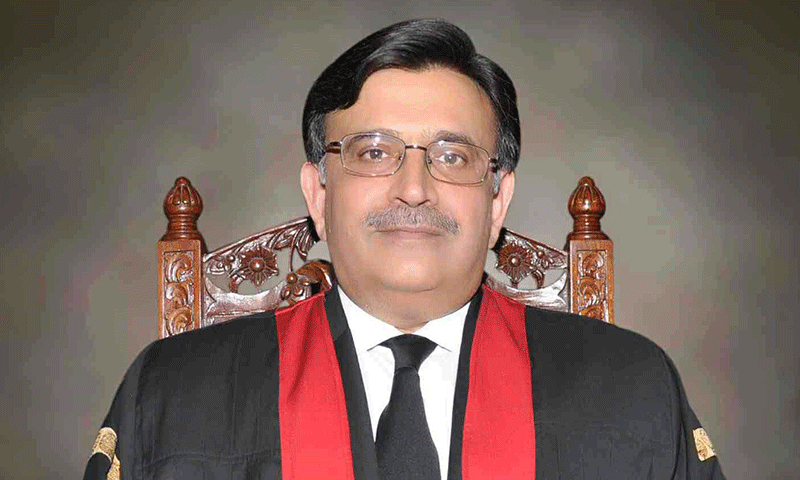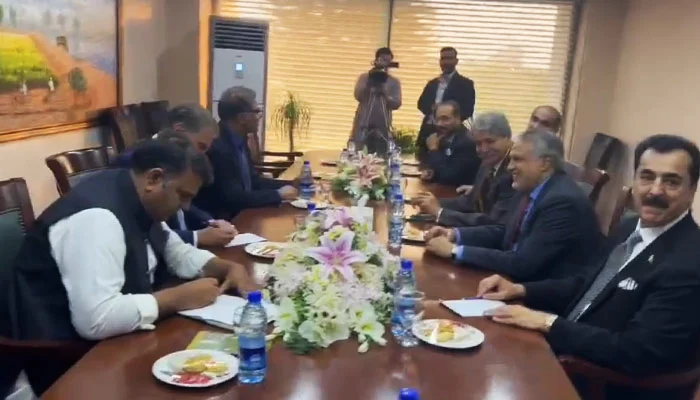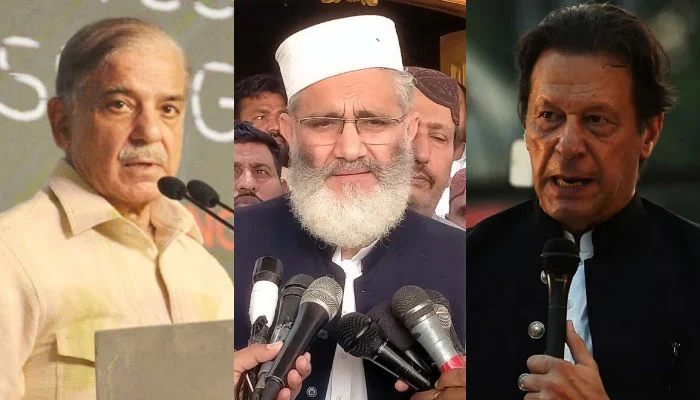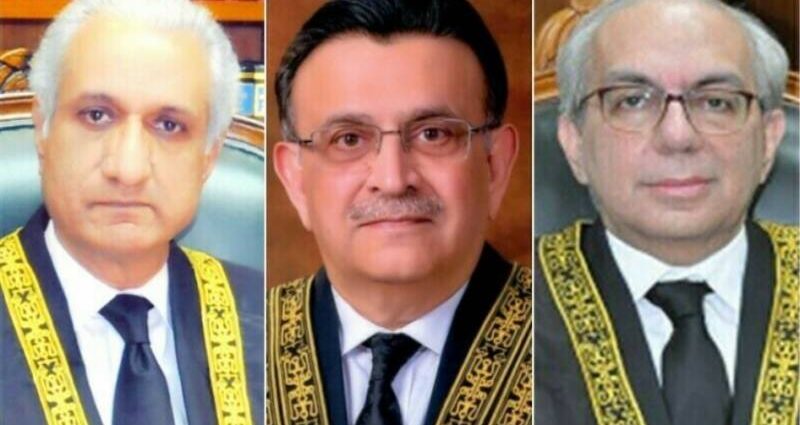
CJP Umar Ata Bandial says top court can’t force govt to hold negotiations with the opposition
Says politicians should themselves find solutions to the problems
Says court will not issue any directives nor will it issue a timeline for the talks
ISLAMABAD ( Web News )
Chief Justice of Pakistan (CJP) Umar Ata Bandial said on Thursday that the Supreme Court could not force the government to hold negotiations with the opposition.
He passed these remarks as a three-member SC bench, headed by the CJP and comprising Justices Ijazul Ahsan and Munib Akhtar, took up the elections delay case. However, the hearing was adjourned barely an hour after it started with the CJP saying that a detailed order would be issued later.
At the previous hearing, the court had asked political parties to hold talks on April 26 and come up with a response by Thursday after giving stakeholders a chance to reach an agreement. Political parties had been asked to decide the matter quickly, since the May 14 date for elections was still in the field and the order was binding on all authorities.
However, no talks were held and the government also refused to comply with the April 4 directive.
A day earlier, National Assembly Speaker Raja Pervaiz Ashraf, on demand of the lawmakers, wrote a letter to the CJP saying that “it is best to leave the resolution of political matters by the parliament and the political parties”.
During the hearing on Thursday, the court raised questions over the government’s “seriousness” regarding holding negotiations. “What steps has the government taken to show its good will? It seems like the government is playing pass-pass,” Justice Bandial said.
He also remarked that politicians should themselves find solutions to the problems, adding that “the Constitution and our order [on polls] is present” if the differences were not sorted out via talks.
Ahead of the proceedings, a number of politicians and lawyers including PTI’s Makhdoom Shah Mahmood Qureshi, Law Minister Azam Nazeer Tarar, Attorney General for Pakistan (AGP) Mansoor Usman Awan were present.
At the outset of the hearing, AGP Awan informed the court that the first contact between the government and the opposition took place on April 19 and it was decided that a meeting will be held on April 26.

He elaborated that PML-N’s Sardar Ayaz Sadiq and Khawaja Saad Rafique met PTI’s Asad Qaiser on April 25, however, the latter said he was not authorised to decide on the matter of talks.
Here, the CJP asked: “After Asad Qaiser’s refusal, was an attempt made to find out who is authorised for the talks?”
The AGP replied that despite differences, the government and PTI had differences found a way forward and apprised the court about a committee formed by Senate Chairman Sadiq Sanjrani for political dialogue.
“The Senate chairman has asked both the government and opposition to nominate four names each [for the talks],” Awan said, adding that he had found out from the media that PTI’s Qureshi was authorised for the negotiations.
“In what capacity was the Chairman Senate contacted?” Justice Bandial asked, noting that Sanjrani was neither the representative of the government nor the opposition. “If the government was serious about negotiations, it would have made efforts itself.
“The court can’t force the government to hold negotiations,” the top judge remarked, stressing that the court only wanted implementation of the Constitution so that a way could be found out of the current crisis.
“We don’t need any explanations, give us a solution,” he said, highlighting that it would take Sanjrani’s committee time to initiate the talks.

At that, PPP lawyer Farooq H. Naek said that all the coalition parties had agreed on holding talks with the PTI and Senate was the only forum where all the political parties were present.
He further stated that the Senate chairman was playing the role of a facilitator and negotiations would only be held by the political parties. “This is a political issue and will only be solved by political leaders … only politicians should be allowed to decide the future of politics,” Naek added.
Here, the bench called Qureshi to the rostrum. The PTI leader recalled that the court had provided the political leaders with a chance for consensus during the previous hearing.
“But the Pakistan Democratic Movement has still not reached a consensus regarding the talks,” he claimed, highlighting that the PTI had taken the court’s order seriously.
Qureshi revealed that no one had reached out to the PTI as yet. “Imran Khan had named me, Fawad Chaudhry and Senator Barrister Syed Ali Zafar for the talks,” he said. “But to date, no one has approached me.”
The PTI leader went on to say that the Senate chairman called him yesterday regarding the committee for political dialogue. “I asked him where the advisory given by the SC was … the Senate committee is just a delaying tactic.”
On Wednesday’s NA session, Qureshi said that it was a violation of the parliament’s rules, emphasising that a matter that was being discussed in the court could not be dragged into the parliament.
“I felt ashamed at hearing threatening language and tone in the parliament … it was said that contempt of parliament has taken place,” he regretted.
At one point during the hearing, the former foreign minister also said that if the government was “serious”, PTI was ready for negotiations “right now”. But at the same time, he claimed that the government had decided to violate the Constitution and the court orders.
In rhetoric to Qureshi, Naek questioned who was looking down on the parliament and the court. “We can’t agree with what Shah Mahmood Qureshi said.
“Give your names to the PTI. We are ready to sit for talks tomorrow,” he added.
At that, the CJP said that one had to be patient when it came to negotiations. “The court never passed an order [for talks], it is just advice. It will be business as usual if a consensus, for the protection of national interest and the Constitution, is not reached,” Justice Bandial added.
He asked what “is the science” behind providing names for talks and if the government had nominated five members from its side. To this, Naek replied that the government would finalise its names within three to four hours.
The top judge also expressed hope that talks between the PTI and government would be held today and suggested that PPP’s Naek was included in the negotiations “to keep the matter cool”. However, Qureshi pointed out that the Senate chairman had only asked for the nomination of senators.
Meanwhile, AGP Awan assured the court that efforts were being made to hold the first meeting, between the PTI and the government, today.
For his part, PTI’s Fawad Chaudhry said: “Neither the parliament nor the SC, only the Constitution is superior. On elections, the Constitution is clear and even the court can’t change that.”
He further said that political parties should not be given the authority to decide on a date for elections, arguing that “if this happens, no government will issue funds for polls”.
Subsequently, the CJP said that political matters should be solved only by talks and adjourned the hearing. He said that the court was not issuing any order or timeline and that a detailed verdict would be released later.
Chief Justice of Pakistan Umar Ata Bandial urged the ruling alliance and the opposition to sit together for talks on elections for the sake of the Constitution.
“Please for the sake of the Constitution sit with each other,” remarked CJP Bandial. While wrapping up the hearing for Thursday, CJP Bandial remarked that the court will not issue any directives nor will it issue a timeline for the talks. However, he added that the court will issue an appropriate order.
Talking to the media after the hearing concluded, Shah Mahmood Qureshi said that the PTI was prepared to sit in the parliament at 4:00 PM on Thursday for negotiations. “We will be there only if the government is serious about the talks.”
The PTI leader stated that his party had already put forward the details of its committee for dialogue and demanded that the government should do the same.
He said that the PTI feared the government would use the talks as a “delaying tactic”. “This is their way to run away from elections and therefore we want to see if they are serious about it,” Qureshi reiterated.
The former minister further said that CJP had given political parties a chance to sit together. “This is also a test for the political leadership on whether it is ready to work for the Constitution or destroy it. Do we want to repeat the history or do we want to start over?”
On the other hand, Fawad Chaudhry warned that the process of negotiations could not be prolonged.
“You have to take a decision within two to three days, otherwise elections will be held as per the Constitution [within 90 days],” he said, adding that if an outcome didn’t come out of talks, the law would take its course. “The SC’s April 4 order already stands,” Fawad added.
Awami Muslim League (AML) Chief Sheikh Rashid Ahmed said that negotiations were “a waste of time”, claiming that the government was not in a position to conduct elections. “Nothing will come out of these negotiations, the decision will only come from the SC,” he added.

